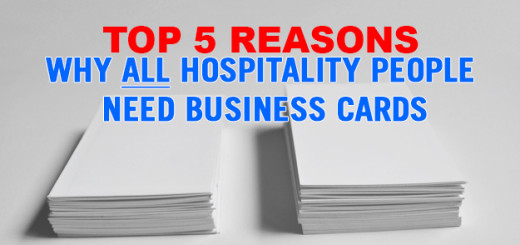14 Ways to Get Free Traffic to Your Hotel Website
 So you’ve got a sparkling, brand-new website. Great! Now how are you going to get traffic to it? After all, what good is a website if no one sees it?
So you’ve got a sparkling, brand-new website. Great! Now how are you going to get traffic to it? After all, what good is a website if no one sees it?
If you want traffic immediately, then purchasing search engine marketing (SEM) ads is a great way. However, traffic from SEM stops when you stop paying. Wouldn’t it be nice if you could get a bunch of traffic for free?
Truly, there is no “free” way to get traffic to your website. Many of these tips take time, and time is money. But here are some strategies you can use to increase your website’s traffic without cracking open your wallet.
For this list, I’ll avoid common strategies that often promise to deliver quick “viral” results, but more often than not, fail to help in any way, such as posting to digg, reddit and stumbleupon, and article marketing with free article directories.
Instead, I will focus on tactics likely to immediately benefit your website in small ways, and that combined can give your website significant new traffic over time.
1) Place your website address on your invoices
This is really hardly a tip at all as it is so obvious, but you’d be surprised how many hotels I’ve stayed at that fail to even mention their website on their paper collateral. Many guests like to return to hotels where they’ve enjoyed their stay, even if they originally discovered the hotel on an online travel agency (OTA). Include your website address on all paper collateral you produce, including invoices, which they will likely keep for tax purposes. Next time, they may book through your website instead of going right to Expedia, increasing your profits.
2) Include a coupon with receipts
Encourage repeat customers by including coupons, promos, and discounts with your receipts at the end of guests’ stays. To use the coupon, guests must visit your website and punch in the coupon code, ensuring you get a new direct reservation.
3) Redirect Wi-Fi guests to your homepage
Free Wi-Fi has become a staple of hotel accommodations—indeed, many guests refuse to stay at hotels that don’t offer free Wi-Fi. Instead of just having an open Wi-Fi network, require a passcode that you give to guests when they check-in. After your guests sign-in to your Wi-Fi network, redirect them to your hotel’s website homepage, or maybe to your promotions page. They’ll instantly learn of your website and it will be logged in their browser history in case they forget the URL and want to visit again. This also gives you the opportunity to up-sell them with add-ons, or to give them vacation ideas for future trips.
4) Invite previous guests on Facebook to like your Facebook page
You likely collect email addresses from all your guests. Most of your guests are on Facebook. Invite them to “like” your Facebook page using Facebook’s email contact upload feature. This will improve the usefulness of your hotel’s Facebook page, allowing you to market promotions directly to your guests, giving you the opportunity to send guests directly to your website.
After you log into your Facebook page, click the Build Audience button.

Here you can upload a list of email contacts, or sync Facebook with a 3rdparty email service you might use, such as MailChimp.

After you send the invite, guests will receive a notification and then choose whether or not they want to “like” your page, and follow your updates.
It is probably a good idea to invite former guests to “like” you page soon after they finish their stay with you and the experience is fresh in their minds, lest they forget about you.
5) Create a Google+ Local Business Page
Creating or claiming your Google+ Local Business page is, in my view, one of the most essential marketing steps you need to take for the search engine health of your property. That said, this is also a complicated step involving many moving parts. Once done, your hotel website is more likely to gain the following benefits:
- Google may rank your website higher on search engine result pages (SERPs)
- Your property may appear in the Carousel (learn more about it)
- An info box about your property may appear in the SERP for branded queries
- Many extensions may appear alongside your website result in the SERPs, including hotel reviews, star rating, social vote buttons, and contact info like phone numbers and addresses
- Your property will become easier to quickly find from mobile devices, increasing your last-minute reservations
I’ve written several guides to help walk you through setting up everything needed for full Google+ coverage.
- Create or claim a Google+ Local Business Page
- How to enable Publisher Markup for your hotel
- The Google+ Handbook for Hotels
6) Take advantage of the Billboard Effect
When guests research for their upcoming trip, they often go to OTAs like Expedia to search for hotels. That said, many guests will then open a new tab in their browser and research the individual hotels they discovered on the OTA. In this way, guests who find your hotel on OTAs may also end up on your website—a phenomenon known as the Billboard Effect. List some of your inventory on OTAs to gain more traffic to your website and more direct bookings. Since bookings from OTA come at the cost of an OTA commission, one could argue whether or not this tip is “free”.
The below video by the researchers at Cornell explains the Billboard Effect.
7) Offer Twitter discounts
Millennials (like me) who are quickly becoming the most coveted travel demographic, are big fans of Twitter. We use Twitter for information including recommendations about movies, products, and yes, travel. Search Twitter for tweets about your hotel’s location, or vacation spots near your hotel. Then, “tweet” at these people, offering them discounts or other gifts to stay at your property when they visit, including a link back to your website and booking engine.
8) Include a TripAdvisor review request on invoices
Sending guests to TripAdvisor may not sound like a way to get traffic back to your website, but there is a strategy behind this. TripAdvisor is one of the most trusted sources for hotel reviews at the moment, and Google knows this, which is why they include links to TripAdvisor reviews of your hotel right in the SERPs. Your property must have good reviews on TripAdvisor.

Guests may click on TripAdvisor reviews when doing research for your property, see your great reviews, and then either go directly to your website from TripAdvisor (if you have your website listed there), or if they can’t find it, hit back, and access your site directly from the Google SERP (yet another example of the Billboard Effect).
Include reminder cards with your invoices, to remind guests to leave a review for your hotel on TripAdvisor, Yelp, and other directories important to your business.
9) Comment on blogs and forums
I don’t suggest you comment on blogs and forums to gain backlinks. Those are less helpful for SEO than they used to be and are incidental to your strategy here. Instead, comment on blogs and forums to capture traffic from them, and refer guests to your website.
Do a Google search as your guest normally would, using keywords they might such as “best Aspen ski resorts”, or something similar. Then, go through all the “Aspen ski resort” blogs and community forums you find, and bookmark them. Join them, become a member, and then start actively participating in those communities. When you comment on a relevant blog, ensure your website address is added to your profile. When you comment on forums, ensure your forum signature includes your hotel name, address, phone number, and website address. If you are a valuable member to these communities (and are not spamming promotions and links), then guests who stumble upon them while doing research, as you did, may click through to your website and book.
10) Answer questions on Quora and Yahoo! Answers
There are many “question and answer” websites out there. Some of the most popular are Quora and Yahoo! Answers. On these websites, guests will often ask questions related to your property, such as “What resort is closest to the ski slopes at Crystal Mountain” or “What trails should I use when exploring the Grand Canyon”? These kinds of questions are coming from people in the planning phase of their trip. Answer their questions using your unique knowledge to not only give them great advice, but point out your property is nearby, and might be a good base of operations for their adventures. Be sure not to market too heavily or else your response won’t be voted up—use a light touch, and always provide quality, accurate information.
For each “question and answer” site, use the search functionality on the site to find questions pertaining to your expertise you can answer. Even if the question has already been answered, it does no harm to weigh in with your unique perspective. Future travelers may perform a Google search related to the question, and then find your answer when doing research and hit your website.
11) Create YouTube videos
YouTube is the second most popular search engine in the world, bigger than Bing and Yahoo! combined. Have some content on there that directs guests back to your website. Thankfully, your hotel and location are perfect subjects for excellent videos.
Create some video walkthroughs of your property. Travel to popular tourist destinations near your property and shoot walk-through videos, or create a video showing the specific sights to see, or how to access certain areas that only the locals know about—and so on.
When you upload these to YouTube, make sure that you give them short, keyword-optimized titles, as the title is the most important thing that will determine whether or not your video gets seen. Also, write useful video descriptions, and link to your website at the top of your video description—the link must be the first thing on your video landing page, below the video itself.
You can also aid discoverability of your videos by uploading transcripts of your videos (if they include words).
12) Add your hotel to local directories
This probably goes without saying, but it’s important to add your hotel to local directories that people actually visit. Not only will this give you more referral bookings, but Google will look to your directory listings as a “sanity check” to make sure they have correct info about your hotel. The more trusted sanity checks they can make, the more trust they will have in your property, and they may rank you higher in Google SERPs.
Use a service like GetListed to list your hotel on each major directory. Some important ones for hotels include:
13) Create content
Search engines love long, high-quality content, in the form of articles, blog posts, guides, videos, images, and so on. If your website has no rich content, then search engines have nothing to rank, and your website traffic will suffer. Invest some time creating quality content that only you can create. I explore some specific ideas in part one of my article:
14) Send a thank-you postcard
If you collect your guests’ physical home address when they make reservations, experiment with sending your guest ”thank you” post cards a week after their stay, and use the opportunity to inform them of your website, with, say, a coupon or promotion, as we discussed earlier. Abusing this privileged information can do you more harm than good, but one, single, simple “thank you” post card after they stay with you is appropriate, and will be appreciated.
About Brandon Dennis
ORIGINAL SOURCE: http://www.buuteeq.com/blog/14-ways-get-free-traffic-hotel-website/
Photo credit: Flickr Creative Commons



